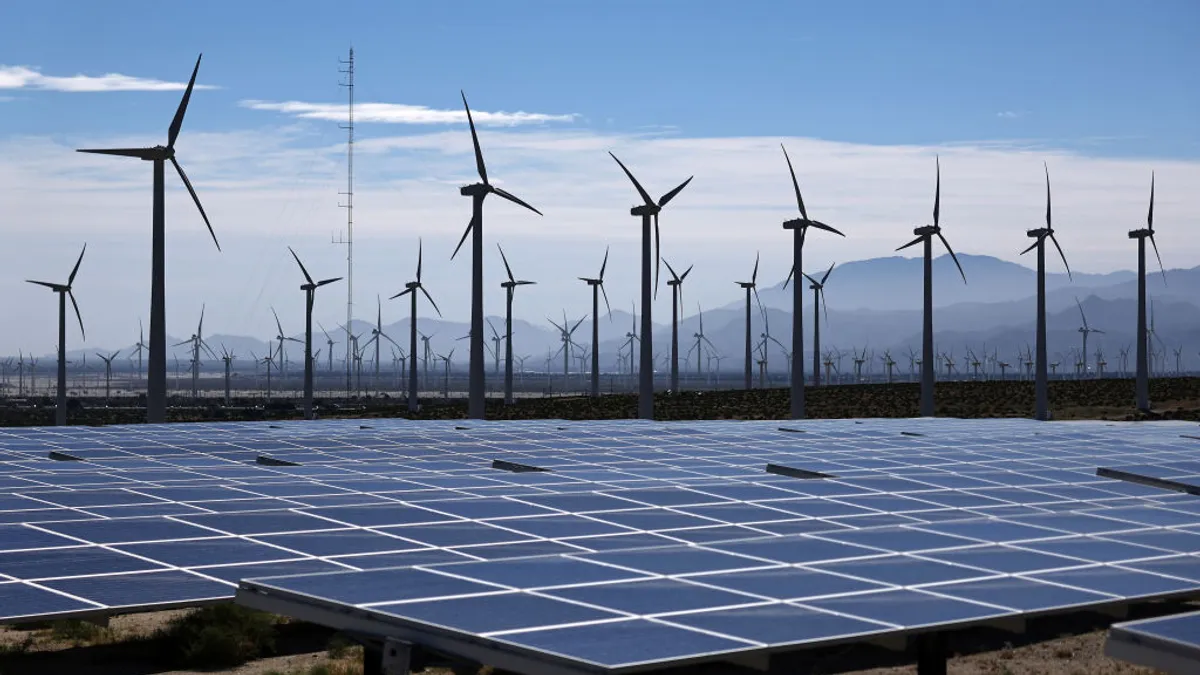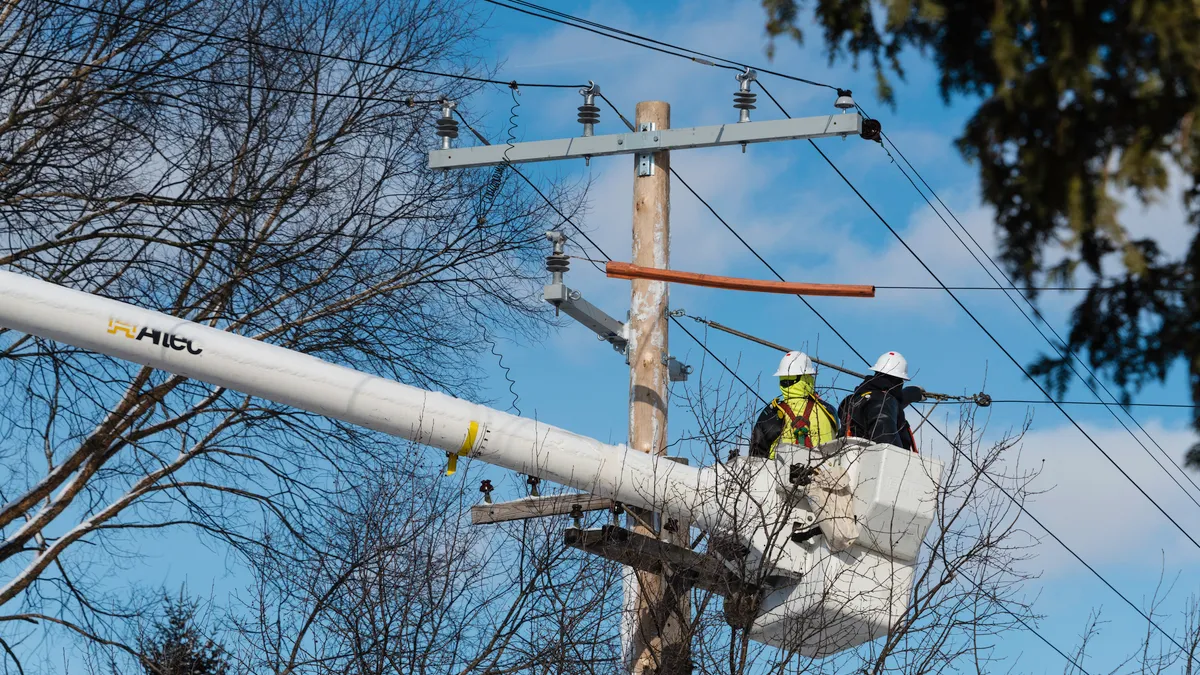Dive Brief:
- The Department of Energy is exploring how it could overrule state energy policy decisions, senior officials said Monday, potentially using the Secretary of Energy’s authority to protect national security.
- Secretary of Energy Rick Perry said at an oil industry event that he is evaluating how to balance states’ rights with his goals of siting more energy infrastructure and preventing power outages. He previously said DOE could look to preempt state energy policies if the agency determined power reliability was threatened.
- The comments came as the secretary submitted letters to the National Petroleum Council to conduct studies on oil and gas infrastructure and commercialization of carbon capture utilization and storage (CCUS) technologies. In response to a climate protestor at the event, Perry slammed criticism of the fossil fuel industry, saying it "is leading the world when it comes to ... affecting the climate in a positive way."
Dive Insight:
Secretary Perry revived his national security narrative at a Monday event in Washington, D.C., telling the National Petroleum Council that while he respects states’ rights, the DOE could step in when it feels state policies are threatening the energy supply of other states.
Perry highlighted state gas pipeline approvals as one situation where DOE could intervene, critiquing the idea that the “governor of New York can stop a pipeline going across [the state] because he thinks that's the political best decision or philosophically he's not in support of that.”
“The issue is, are the people in that state, or are the people on the other side of that state, well-served by the political decision of a state that is between them and the energy resources that can keep their people safe are economically viable?” he said.
The secretary hit on the Polar Vortex as an example of a national security event that could require intervention, claiming residents had to choose between heat and electricity during the 2014 cold snap that constrained fuel supplies to some generators.
“That is a serious situation that is certainly a real possibility again and I think as a country we need to sit down and have a thoughtful conversation about, is America's energy infrastructure in the national security of this country?” Perry said. “I'll suggest to you that it is.”
It’s not the first time Perry has opined on the DOE’s national security powers. In June, ahead of the release of his agency’s grid reliability study, he told an energy conference that DOE could seek to intervene in state energy policies if it felt power reliability was threatened.
The grid report itself found that reliability of the bulk power system remains strong, but DOE Deputy Secretary Dan Brouillette said the agency continues to explore how it can ease infrastructure siting in the name of energy security.
“We are looking at the eminent domain authorities given to DOE,” he told oil industry leaders. “We’re looking at it in a number of different areas including this particular area [of pipelines], but also with regard to electricity and looking to site electrical infrastructure and whatnot.”
There’s “currently a raging debate” over the DOE’s eminent domain powers, Brouillette noted, and Perry is still evaluating how the agency should proceed. “Instinct tells me that with regard to infrastructure we want to see more, not less,” he said. “It would be the irony of ironies if we had all this [oil and gas] production and no way to move it to market.”
Perry’s previous national security comments in June set the clean energy sector on edge, with industry officials and lawmakers concerned that DOE would attempt to overrule renewable portfolio standards, nuclear subsidies or other energy policy supports. But Brouillette said after the event that the policy options being considered at DOE are narrower than that.
“The marketplace works very, very well but there are certain instances where you have to step back and say, ‘Wow, maybe we should take a more aggressive step than the market might allow at this moment,'” Brouillette said. “That's where he has authorities under the Federal Power Act to step in and do those types of things.”
One potential option, Brouillette said, would be to use the secretary’s power under Section 202 (c) of the FPA to require generators to operate in times of emergencies. The DOE exercised that option in June, allowing a Dominion coal plant in Virginia to run before it could make emissions upgrades.
“It's very temporary, but those are the types of things,” Brouillette said. “You can’t build a transmission line in a day. You can't force a plant to run sometimes if it's uneconomic, so the secretary has the ability to step in and say ‘okay we're going to bypass, we're going to issue this order if you will and force that thing to run,’ because that's what it takes at times.”
Brouillette said that RPS policies are likely not on the agenda for intervention, but applying DOE eminent domain powers to pipelines would have to be decided on a case-by-case basis.
“We can’t stop a state legislature and a governor from doing what they think is in their self interest, but these are interstate industries,” he said. “That's why it's situational. It's not a blanket decision that [Perry’s] going to make and say, 'In every instance, I'll be the final arbiter.'”
CCUS and fossil fuels
Perry and Brouillette’s comments came as DOE asked the National Petroleum Council to conduct two new studies — one on oil and gas infrastructure and one on CCUS.
The infrastructure study is meant to identify constraints and threats to the oil and gas system in light of recent damage to Gulf Coast facilities by Hurricanes Harvey and Irma. The carbon capture study aims to identify pathways to commercialize CCUS, “including R&D and policy options to integrate CCUS into the marketplace,” Perry said. The National Coal Council completed a similar study for DOE in 2015.
Environmental protestors disrupted the NPC event on Monday, a common occurrence at energy policy events, with one demonstrator telling Perry that “people are dying” as a result of climate change.
The protest prompted the secretary into an extended monologue on the social benefits of the fossil fuel industry. Touting the economic growth of his home state of Texas, Perry said the oil industry is “affecting the climate in a positive way” by helping the U.S. power sector cut emissions.
“The U.S. led the world in the reduction of emissions — that comes from the International Energy Agency,” Perry said. “I'm proud to be a part of this industry. I'm proud to be an American. You wanna talk about saving lives? That's what we're doing. It's this industry with our innovation and our technology that we're going to export to the rest of the world.”
Perry’s remarks offered a summary of the Trump administration’s larger goals of “energy dominance” through the export of U.S. products and expertise. At no time did the secretary mention the scientific consensus on climate change and its impacts.
“It upsets me when some guy stands up in the back of a meeting here and says, 'What are you going to do? You're killing people,'” Perry said. “No sir! You want to kill people? You take energy away from them.”






















